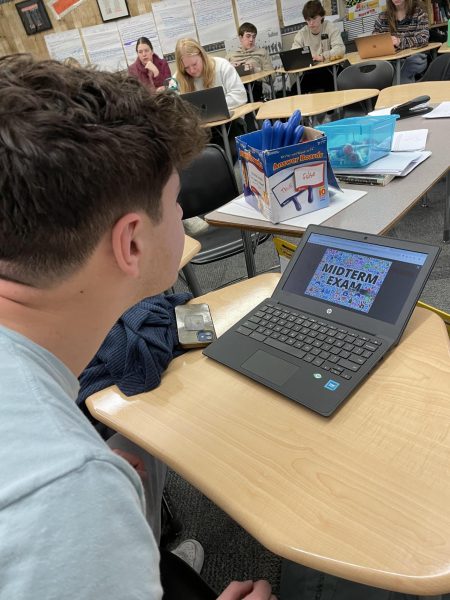
High schools all around the country have used midterms for generations, but do they really reflect students’ knowledge as well as they are claimed to? Midterms are known to be a very stressful time of year for students. With two exams each day for a week, it requires students to have good time management. Students are forced to balance projects, exams, studying, and extracurricular activities while maintaining a positive mindset on top of that.
When interviewing students, they all feel as though there could be a better solution for midterms. A solution that can limit the amount of stress they face as well as be better prepared for their exams. Senior Izzie Wetter states, “I think that we need to be more prepared and have more class time to prepare in the week leading up to midterms. I feel like teachers were rushed, so we didn’t have much time to review in class.” Preparing in class is beneficial for students because they will be able to ask questions and have enough time to study material they are confused about. This can limit the amount of questions during the preparation period directly before the exam.
With multiple tests in one day, there is an overwhelming amount of material to study and review. Sherrie Whitman, a math teacher at Ipswich, states, “Midterms are stressful for all students. Stress is caused for everyone when there are multiple tasks that all have similar deadlines. I believe that stress would be reduced if students only had one midterm a day so the evening before they could focus on one subject; however, in a traditional academic year, there is just not enough time to spread the assessments out over the course of 7 days.” By reducing the number of tests in a day, it would provide students with the ability to focus primarily on one subject at a time. This can also eliminate students trying to review and cram at least two different subjects simultaneously.
With a variety of exams for midterms, it can be difficult for students to show their knowledge and understanding of what they have learned over the span of the semester. Senior Sarah Eliot elaborates, “I believe that it depends on the class. In one class, I have multiple choice, which I feel shows my knowledge of all the topics we have covered, but if it’s an in-class essay, I don’t believe it does a good job showing my understanding since we don’t spend much time focusing on timed essay writing.”
Large tests like midterms have been proven to help younger students, such as freshmen and sophomores, retain knowledge, but according to a study done by the Department of Education, midterms are less effective for older students, such as juniors and seniors. The Department of Education states, “Our results suggest that a second midterm exam may improve learning outcomes for students enrolled in a freshman biology course but not a junior biology course.” These exams work for lower-level students who haven’t learned how to retain their information. It also agrees with the idea that there are other ways to ask kids to withhold new information which can lead to less stress and better study habits.
Midterms are used to prove the knowledge of students from a full semester of learning. However, they may not be the best way to show what students have learned. Students cram studying on the weekend, building up to midterms, because their teacher may still be teaching new information the week before. Students are studying for two subjects in one night because they had an extracurricular activity to attend earlier that day. Midterms can be unfair to students and unnecessarily stressful. The education system needs to find a better way for kids to prove they’ve retained this information than seven stressful exams crammed into a weeks schedule.



